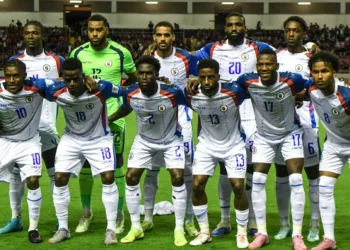India has taken a monumental step toward hosting its second Commonwealth Games as the Union Cabinet, chaired by Prime Minister Narendra Modi, officially approved the country’s bid to host the 2030 Commonwealth Games in Ahmedabad. This historic decision marks India’s ambitious return to the international sporting stage, fifteen years after successfully organizing the 2010 Delhi Commonwealth Games.
Table of Contents
The Cabinet Decision That Changes Everything
The Cabinet approval represents more than just administrative formality—it’s a statement of India’s growing confidence in its sporting infrastructure and organizational capabilities. The Union Cabinet, chaired by Prime Minister Shri Narendra Modi approved the proposal of the Ministry of Youth Affairs & Sports for submission of bid for the Commonwealth Games (CWG) 2030, according to the Press Information Bureau.

The comprehensive approval extends beyond mere permission to bid. It also gave its approval to sign the Host Collaboration Agreement (HCA) along with the required Guarantees from concerned Ministries, Departments and Authorities and sanction of required grant-in-aid to Gujarat Government, in case the bid gets accepted, demonstrating the government’s full commitment to the project.
Strategic Timeline and Process
The path to hosting the 2030 Commonwealth Games involves several critical milestones that India must navigate successfully:
| Phase | Timeline | Key Requirements |
|---|---|---|
| Bid Submission | August 31, 2025 | Final bid documents to Commonwealth Sport |
| Host Selection | November 2025 | General Assembly decision in Glasgow |
| Preparation Period | 2026-2030 | Infrastructure development and planning |
| Games Execution | 2030 | Multi-sport event hosting |
Ahmedabad: The Ideal Host City
The selection of Ahmedabad as the proposed host city reflects careful strategic planning and existing infrastructure advantages. Ahmedabad is an ideal host city offering world class stadiums, cutting-edge training facilities, and a passionate sporting culture, as emphasized in the official government statement.
The city’s credentials are anchored by the iconic Narendra Modi Stadium, the largest stadium in the world, which has already demonstrated its capability by successfully hosting the 2023 ICC Cricket World Cup Final. This massive venue, with a seating capacity exceeding 130,000, serves as the centerpiece of India’s hosting ambitions.
Infrastructure Excellence and Development
Ahmedabad’s sporting infrastructure extends far beyond the Narendra Modi Stadium, encompassing a comprehensive ecosystem designed for world-class multi-sport events:
Current Facilities:
- Narendra Modi Stadium (World’s largest cricket stadium)
- Existing sports complexes and training facilities
- Modern transport connectivity and hospitality infrastructure
Under Development:
- Sardar Vallabhbhai Patel Sports Enclave
- Dedicated aquatics center
- Multi-purpose football stadium
- Two specialized indoor sports arenas
| Venue Type | Status | Capacity/Features |
|---|---|---|
| Main Stadium | Operational | 130,000+ seating |
| Sports Enclave | Under Construction | Multi-sport complex |
| Aquatics Center | Planned | Olympic-standard facilities |
| Indoor Arenas | Planned | Two specialized venues |
Economic and Social Impact Projections
The 2030 Commonwealth Games promise to deliver substantial benefits across multiple sectors of Indian society and economy. Athletes from 72 countries will participate in the Commonwealth Games, bringing with them coaches, technical officials, media personnel, and tourists, creating a massive economic opportunity for the region.

The government anticipates significant positive impacts including job creation, tourism boost, and infrastructure development that will benefit Gujarat and India long after the Games conclude. Beyond sports, hosting the CWG in India would leave a lasting impact boosting tourism, creating jobs and inspiring millions of young athletes.
Professional Opportunities and Legacy
The Games are expected to create numerous professional opportunities across diverse sectors:
- Sports science and athlete support services
- Event operations and management
- Logistics and transport coordination
- Broadcast and media production
- IT and communications technology
- Public relations and communications
- Hospitality and tourism services
India’s Commonwealth Games Heritage
India’s bid builds upon the foundation of its successful 2010 Delhi Commonwealth Games, which marked the country as a capable host for major international sporting events. The Delhi Games not only showcased India’s organizational capabilities but also left behind a legacy of world-class sporting infrastructure that continues to benefit Indian athletes.
The proposed 2030 Games in Ahmedabad represent an opportunity to demonstrate India’s evolution in sporting event management, incorporating lessons learned from 2010 while leveraging significantly improved infrastructure and technological capabilities.
Comparison with Previous Hosting
2010 Delhi Commonwealth Games:
- India’s first CWG hosting experience
- 71 nations participated
- India’s most successful CWG performance (101 medals)
- Significant infrastructure development in Delhi
2030 Ahmedabad Bid:
- Enhanced infrastructure and facilities
- Expected participation from 72 countries
- Leveraging proven hosting experience
- Integration with broader Olympic ambitions
Strategic Positioning and Competition
India’s bid enters a competitive but favorable landscape following Canada’s withdrawal from the hosting race citing budgetary constraints. This development significantly strengthens India’s position as a serious contender for hosting rights.
The General Assembly of Commonwealth Sport will decide the host country in the last week of November in Glasgow, where India will present its comprehensive bid highlighting Ahmedabad’s capabilities and the country’s proven track record in organizing major sporting events.
India’s Competitive Advantages
- Proven Track Record: Successful hosting of multiple international events
- World-Class Infrastructure: Narendra Modi Stadium and supporting facilities
- Government Support: Full Cabinet approval and financial backing
- Strategic Location: Accessibility for Commonwealth nations
- Cultural Appeal: Rich heritage and warm hospitality
Integration with Olympic Ambitions
The 2030 Commonwealth Games bid strategically aligns with India’s broader ambition to host the 2036 Olympic Games, with Ahmedabad also being a front-runner for that prestigious event. The city’s sporting infrastructure is being systematically upgraded with both objectives in mind, creating a sustainable long-term sporting legacy.
This dual focus ensures that investments in infrastructure and organizational capacity serve multiple purposes, maximizing the return on public investment while establishing India as a preferred destination for major international sporting events.
Political and Administrative Support
The unanimous Cabinet approval reflects strong political commitment across government levels. Union Minister for Youth Affairs & Sports Mansukh Mandaviya expressed gratitude to Prime Minister Modi, noting that “India has rapidly progressed towards becoming a sports superpower in the last 11 years” and that “today’s decision demonstrates that we are fully prepared to host international competitions.”

This high-level political support ensures that the necessary resources, coordination, and bureaucratic backing will be available throughout the bidding process and potential hosting preparations.
FAQs
When will India know if it has won the right to host the 2030 Commonwealth Games?
The General Assembly of Commonwealth Sport will announce the host country in the last week of November 2025 in Glasgow, after reviewing all submitted bids and conducting the selection process.
What makes Ahmedabad suitable for hosting the 2030 Commonwealth Games?
Ahmedabad offers world-class stadiums including the Narendra Modi Stadium (world’s largest), cutting-edge training facilities, passionate sporting culture, and strong infrastructure development including the under-construction Sardar Vallabhbhai Patel Sports Enclave.
How many countries and athletes are expected to participate in the 2030 CWG?
Athletes from 72 countries are expected to participate in the 2030 Commonwealth Games, along with coaches, technical officials, media personnel, and tourists, creating significant economic opportunities for the host city.
What financial support has the government committed for hosting the Games?
The Cabinet has approved signing the Host Collaboration Agreement and sanctioning required grant-in-aid to the Gujarat Government if the bid is accepted, ensuring comprehensive financial backing for the event.
How does this bid relate to India’s Olympic hosting ambitions?
The 2030 Commonwealth Games bid strategically aligns with India’s goal to host the 2036 Olympic Games, with Ahmedabad’s infrastructure development serving both objectives and establishing India as a premier international sporting destination.








